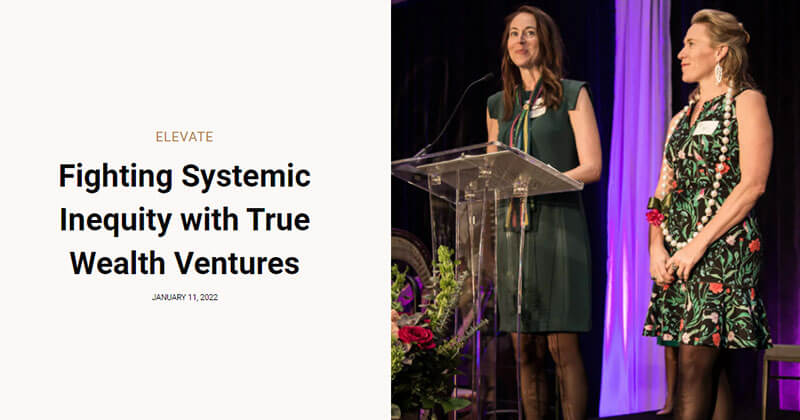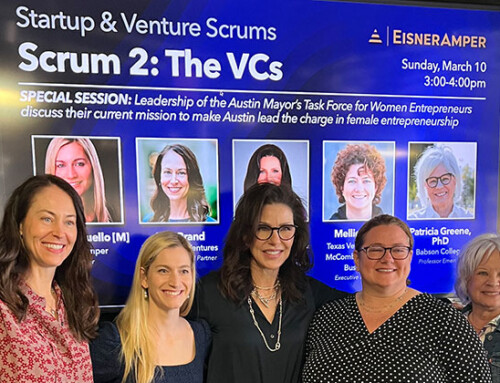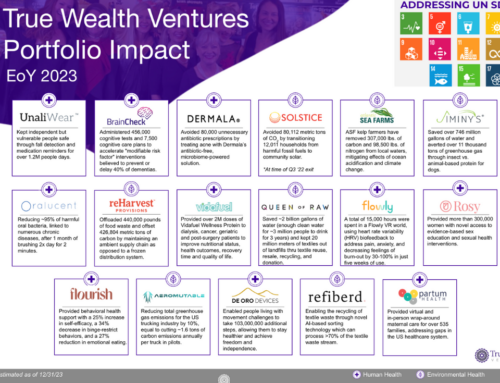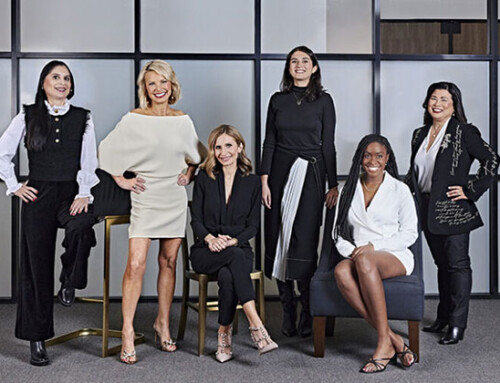Entrepreneurs have built the world around us. Every single tool that you use or service you employ was conceived and manifested because of an entrepreneur.
Thinking about it from that perspective puts a lot of power in the hands of the entrepreneur – and a lot of responsibility on the shoulders of the institutions who fund their projects.
The COVID-19 pandemic revealed many fractures in society’s infrastructure, and the social, political, and economic events of 2020 inspired an awakening throughout the country. People were discussing issues from a systemic point of view, and forcing themselves to face the uncomfortable truths that had been in our peripherals for a long time.
True Wealth Ventures had understood their responsibility to diversify the innovation ecosystem long before 2020, and the events of the last year have only deepened their passion for their cause and, thanks to Zoom, made their deals happen a little quicker.
True Wealth Ventures is a venture capital fund designed to invest in women-led companies that design, develop, and scale consumer health and sustainable products and technologies led by General Partners Sara Brand and Kerry Rupp. Sara and Kerry have been seeking the women who are discovering solutions to the next generation’s most pressing issues since 2015, and we got together with them in 2017 to hear their founding story while they were still raising capital for their first fund.
They have since closed their first fund at around $20 million in 2018, earning an accolade at the time for being the largest venture capital fund to have closed with an explicit gender diversity strategy. They invested in 12 companies at the seed stage out of their first fund, all of which align with their mission to improve environmental and / or human health and have at least one full-time woman on the founding or C-suite executive team.
But they didn’t rest on their laurels – they’ve recently made their first investment out of fund two, in an Austin-based company called Flourish.
While True Wealth Ventures has continued to fight for their cause, the rest of the innovation ecosystem has not shifted much since our conversation in 2017. Last we talked, True Wealth shared that only about 1% of venture capitalists making investment decisions were women, and as it turns out, this 1% figure may have been inaccurate – it was likely higher than the reality.
However, Brand shares it has gone up since 2017, and about 2.4% of the VC population are women in 2021. However, in 2017 only 2.7% of VC-backed companies had a female CEO, and that number has gone down to 1.8% as of the last quarter of 2021.
The responsibility that venture capitalists have is not just to diversify their industry for diversity’s sake. Brand explains that we need diversity in the innovation ecosystem precisely because entrepreneurs shape the world around us through their ideas and contributions, and the problems that entrepreneurs solve are directly related to their lived experience. More diversity in venture capital means that there will be more communities and markets backed by VC which means that the tools, services, and companies that are created will reflect the world that we live in, and not continue to cater to a very specific demographic of person that is currently dominating the innovation space.
Brand shares facts about women investors and women founders in the VC world.
Brand explains that it’s human nature for investors to go with founders that are familiar to them, who are solving problems that they’re aware of – but women see problems that that demographic of men don’t see, as do people of color and other underrepresented minorities. There is a huge population outside of the specific demographic that dominates the venture capital ecosystem currently with critical problems, especially related to health and environment, that entrepreneurs with diverse backgrounds are solving with their companies.
Brand explains that women also generally have more direct exposure to the issues that innovations are solving than men. “Women make 85% of consumer purchase decisions, 90% of home purchases, and 80% of healthcare decisions for themselves and their households,” Brand explains, and thus women can often even have an advantage over men in that they can see the opportunities for solutions in these markets more clearly.
Investing in women-led companies thus incurs less risk because women really understand their customer and their customer’s problems and the solution their product is providing – but they also get better returns, by the way.
“Women led VC backed companies have raised 45% less capital than their male counterparts, but they’ve seen 2.5 times greater returns,” Brand explains.
The mitigated risk inherent to women-led companies was tested and proven during the 2020 lockdowns and economic crisis, in which True Wealth Ventures said that business was largely unaffected beyond settling their first deal without ever having met the company’s team in person (although now, that has become much more normal for them). Brand explains that because they have to persevere through other trials from the start of their founding journey, women-led companies tend to be grittier and more resistant to challenges.
Additionally, the companies that True Wealth Ventures invests in are solving environmental and health issues – all of which became even more prescient and important due to the pandemic. So if anything, COVID just revealed how critical the issues that their companies are solving truly are.
So why, if there is less risk involved in women-led ventures, are they receiving almost half as much capital, and making up such a small sliver of the pie of VC-backed companies?
It goes back to representation in the VC ecosystem. The slim representation of women and other minorities as investors in the venture capital space keeps minority-led companies from receiving capital investments. Beyond seeing entrepreneurs who are solving problems that VC investors are familiar with, Brand explains that the “venture capital ecosystem is broken.”
Women entrepreneurs who are seeking venture capital investments will not only raise less money, but are assumed to be riskier than male-founded ventures. They face more prevention-oriented questions that assume inevitable risk while men are asked “promotion-oriented questions” that assume the company will succeed and flourish. This discrimination in the VC space is even worse for women who are also an underrepresented minority, Brand says, calling this the “death of a thousand cuts” – that VCs will assume a down side with women and minority leaders while they assume an upside with male-backed ventures.
This issue isn’t specifically a male issue, but more of an issue in society in general, Brand explains, saying, “Women get promoted based on performance, whereas men get promoted based on potential. So there’s just this mindset culturally, and it’s not like men against women, it’s just culture against women, which makes it so women just don’t raise as much money.”
True Wealth Ventures is not interested in pointing fingers – they’re interested in changing these systemic issues in the venture capital ecosystem through action.
Beyond investing in women-led companies, True Wealth Ventures is interested in involving more women as investors too. Women investors are 2x more likely to invest in companies with female leadership and gender diverse teams, and 3x more likely to care about diversity on the management teams that they back. With more diversity in the venture capital world, there will be more diversity in the entrepreneurs who secure VC funding, and thus more communities whose problems are being solved by these entrepreneurs’ innovations.
Women are also 10x more likely to care about the social impacts of the companies in which they invest, so female investors will back companies that are better for the global community as well. From a pragmatic, financial perspective, it’s not just better for women to get involved as investors – it’s essential.
“Women are estimated to control two thirds of the US’ investable assets by 2030. And so if women aren’t investing in venture capital, it’s a real issue for our innovation economy,” Brand explains.
True Wealth Ventures wants to educate women about how to get involved in the venture capital ecosystem as investors, since this is the most efficient and effective way to get more investing dollars to women entrepreneurs.
True Wealth Ventures faces a few hurdles – in addition to the fact that VC firms can’t market publicly, they are too small of a firm to receive institutional investments. Their investments must come from individuals, family foundations, and other similar entities.These kinds of investors in private equity are hard to find, so True Wealth spends a lot of time networking.
Beyond these constraints, Brand explains that “Women are just not getting invited [to invest], and we really want to change that.” Culturally, women do not share investing opportunities with each other the same way that men share them with each other, and men are rarely sharing these opportunities with women.
Brand encourages women who are interested in investing in venture capital to inquire with their wealth advisor and ask their friends or associates about any VC opportunities, since they will not be approached with these opportunities in the current VC culture.
Educational information for women interested in venture capital investments.
She explains that women who are interested should first confirm that they qualify with the SEC as an accredited investor, and then locate a firm they are interested in investing with. There are different minimums for different firms, but women may be surprised by how palatable some of the constraints are. True Wealth Ventures, for example, has a $250,000 minimum for investors. However, their capital call process to attain that money is on a quarterly schedule over 5-7 years, thus requiring a $10,000 payment every few months rather than a lump sum at any point. People can also invest through their IRAs at some firms, so it’s important to educate yourself before writing off VC investing as an option.
Brand also encourages women to understand the risk involved. Venture capital is known for its high reward, but that also comes with high risk, and it’s an illiquid investment with many rules surrounding it, so there is no such thing as too much education before diving into the shark tank.
True Wealth Ventures is proud to have 80% of their investments for Fund 1 contributed by women or women-led small institutions – a figure that is unprecedented for a VC fund. The vast majority of these fund 1 investors were women who were highly successful and high net-worth individuals who had simply never been asked or invited to the VC table before, and hadn’t realized it was an option for them sooner.
True Wealth Ventures is working to reshape the venture capital ecosystem through education and investing, and as we collectively gain the courage and perspective to face our culture’s systemic issues head-on, our world will start to change for the better, reflecting and accommodating the diverse and vibrant communities that we are part of.
Written by Catherine Casem
Find True Wealth Ventures on Facebook, Twitter, and LinkedIn.






